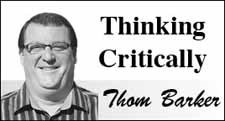As I was preparing for my vacation to Mexico last Thursday I should have been excited, but I wasn't. I was anxious. Not about the trip, but because I had somehow fallen behind on my writing.
Granted, I had lost almost an entire day Wednesday due to a minor medical procedure, but, I had to ask myself, 'how did I let this happen?'
The answer: multitasking.
You have undoubtedly heard people boasting that they are very good multitaskers. You may even be one of those people.
It has become such a common buzzword over the last couple of decades, in fact, that on skills questionnaires for job seekers, it is frequently included.
The fact of the matter is, however, that none of us is good at multitasking. It is, by it's very nature, inefficient, illogical, even dangerous and nothing to be proud of.
For example, over the past two years in Saskatchewan, distracted driving has overtaken drunk driving as the number one cause of traffic collisions and the leading factor in traffic-related injury and death. This simply underscores the fact that people cannot do more than one thing at a time, at least not effectively.
The bottom line is, if you are trying to drive and talk on the phone, eat a hamburger, adjust the radio or put on makeup at the same time, you are not doing either as well as the task requires.
The whole concept of multitasking is at least partially a product of technology. It's something that computer processors do, running multiple services, background programs and foreground applications simultaneously. Since so many of us now work with computers in some capacity, and nearly all of us are inextricably bound to our smart phones like an old fashioned ball and chain, it's natural that we would succumb to the enticing myth that we can do more than one thing at a time.
The thing is, even computers don't necessarily do it well. We have all experienced our devices bogging down because the processor cannot keep up with everything we are asking it to do.
The thing that aggravated me most on Thursday evening as I was trying to catch up is I know better.
I have been aware of the research for at least a decade that shows multitasking reduces productivity. One study even suggested it can reduce a person's IQ because constantly being distracted impairs the cognitive ability to fully process information. This makes sense.
I will give you a practical example. I like watching murder mysteries. When I watch them with my full attention, I frequently solve them along with the detective or can, at least, understand fully the connections that led him or her from point A to point B. When I watch mysteries while I am Facebooking, cooking or doing various other things, I often get to the end and wonder, 'how the heck did we get to this conclusion?'
It's like what our elementary school teachers tried to impart. It is one thing to be able to read, it is another thing to be able to read with comprehension.
And that's another thing I can relate to. I read a lot when I am researching articles. When I concentrate on what I'm reading, I get it immediately. When I'm trying to keep up with email and phone calls etc., I find myself having to do a lot of rereading.
There may also be mental health implications. In 2008, when I was administrator for the Village of Abernethy, I can remember having a lot of anxiety. It was a job that had a lot of moving parts and at times I was overwhelmed. At that time, I read an article by Linda Stone, who is an American consultant who deals with our relationship with technology. In the piece she coined the term "continuous partial attention." She says it is related, but different from multitasking. I contend that it is what most of us are actually doing when we claim to be multitasking.
In a nutshell, the concept is that trying to keep up with everything all the time, being constantly connected through email, texting, Facebook etc., keeps us in a heightened state of awareness and an artificial state of constant crisis.
That's how I was feeling Thursday night. In a normal week, it's not a big deal. I don't mind catching up with work in the evenings or on the weekend, but on the verge of a vacation, I didn't have that luxury.
Then there are the social aspects. How many times have you seen, or been at, a table where everyone is half engaged with the group and have engaged with their cell phones. You might say we are getting to a point in our relationship with technology where we are always connected and never really connected simultaneously.
A couple of weeks ago, in our View from the Cheap Seats feature, we talked about New Year's resolutions. I said I didn't have any because while I do make them, I do not feel duty-bound to an arbitrary date.
In retrospect, I wish I had thought of making the resolution to stop trying to multitask (or be continuously partially attentive if you prefer) and maybe I wouldn't have been frantically trying to get this column done before my flight left on Saturday.
The editor at my very first newspaper job was a stickler for non-multitasking. His mantra was "Pick a task, complete task, move on." He even made up labels and stuck them to all the computer monitors in the building.
Some researchers have even started to call multitasking unethical. The gist of the argument is that people who multitask are basically robbing their employers of productivity and/or quality of the work they do.
On Friday, I applied the "pick a task, complete task, move on" principle and sure enough, here I am at the end of it, writing complete and ready for an anxiety-free week of fun in the sun.




